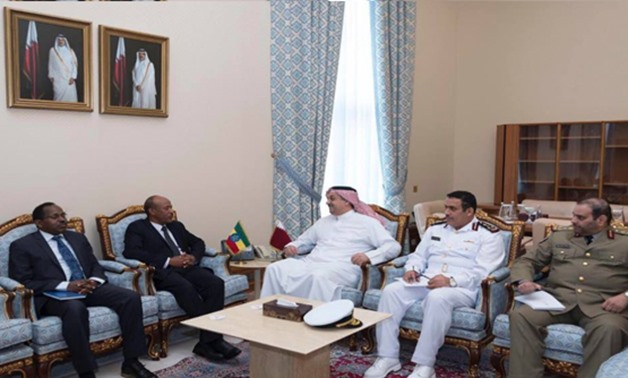
Qatar Defense Minister, Khalid bin Mohammad Al Attiyah, met his Ethiopian counterpart, Siraj Fegessa - File photo
CAIRO –14 November 2017: The Qatari regime continues its villainous role in funding and inciting Ethiopia and Sudan to escalate the crisis with Egypt by holding meetings with the Ethiopian prime minister and minister of defense, as well as the Sudanese president and Sudanese officials, coinciding with the meeting of the Tripartite National Committee in Cairo on Sunday.
Ethiopian Prime Minister Hailemariam Desalegn headed to Doha on Monday, directly after the Tripartite National Committee meeting in Cairo failed to approve the initial studies' report on the regional impact of the Grand Ethiopian Renaissance Dam (GERD).
Qatari Emir Tamim bin Hamad invited the Ethiopian prime minister to discuss ways of enhancing and promoting bilateral relations between the two countries in an attempt to persuade Ethiopia to escalate the crisis with Egypt.
The visit came in the framework of pursuing Qatar’s national political agendas to undermine Egyptian security and stability, a Qatari opposition source revealed to Egypt Today, indicating that they discussed the issue of funding the Renaissance Dam during the visit.
At the same time, the Sudanese president received Qatar Finance Minister Ali Shareef Al Emadi and Qatari Ambassador to Sudan Rashid bin Humaid Al Nuaimi to discuss promoting bilateral relations between the two countries.
In addition, Qatari Defense Minister Khalid bin Mohammad Al Attiyah met his Ethiopian counterpart, Siraj Fegessa, to discuss the defense and military fields and means of enhancing and developing them, in addition to the exchange of experiences and military training courses.
Cairo hosted the 17th round of the Tripartite National Committee negotiations on Sunday, which was attended by the irrigation ministers of the three Nile Basin states.
It aimed to reach a consensus over the introductory report prepared by two French firms, BRL and Arterlia, on their technical studies of the dam's potential impact on Egypt and Sudan, according to Minister Abdel-Ati.
The studies were proposed to begin in late 2016, but required an agreement on methods from the three governments before they could begin.
Abdel-Ati said that committee did not reach an agreement on adopting guidelines. The guidelines were indicated in a report prepared by a technical committee on the effects of the Grand Ethiopian Renaissance Dam on the Nile Basin states after two days of talks.
Abdel-Ati declared that Egypt approves of the report’s outcomes, but the Ethiopian and Sudanese did not express consensus and called for amendments. Egypt halted all negotiations and said that all future decisions are at the hand of the cabinet.
Although Sudan was initially opposed to the dam’s construction, the country has recently warmed to the idea. This could be because Sudan has agreed to purchase electricity from the dam, while the two countries have also agreed to collaborate on a free economic zone.
Abbas Sharaky, chair of the Natural Resources Department at the African Studies Center at Cairo University, said in a TV interview on Monday that Egypt should have raised its objections to the United Nations since construction works already started. He said that it would not cripple the negotiations with Ethiopia.
Sharaky added that Ethiopia did not adopt correct studies when building the dam, and that chances of it collapsing are quite possible, which would inundate Sudan.s
Egypt has previously expressed concerns about the ongoing delays in the approval of the technical studies, given that Ethiopia is continuing the construction of the dam.
Egypt’s concerns include the negative impact the Ethiopian dam will have on their historic Nile water share, amounting to 55.5 billion cubic meters in Egypt only, in accordance with the historic 1959 agreement with Sudan.
In April 2011, Ethiopia started the construction of the Renaissance Dam over the Blue Nile River, one of the major sources of water to Egypt’s Nile Delta.


Comments
Leave a Comment